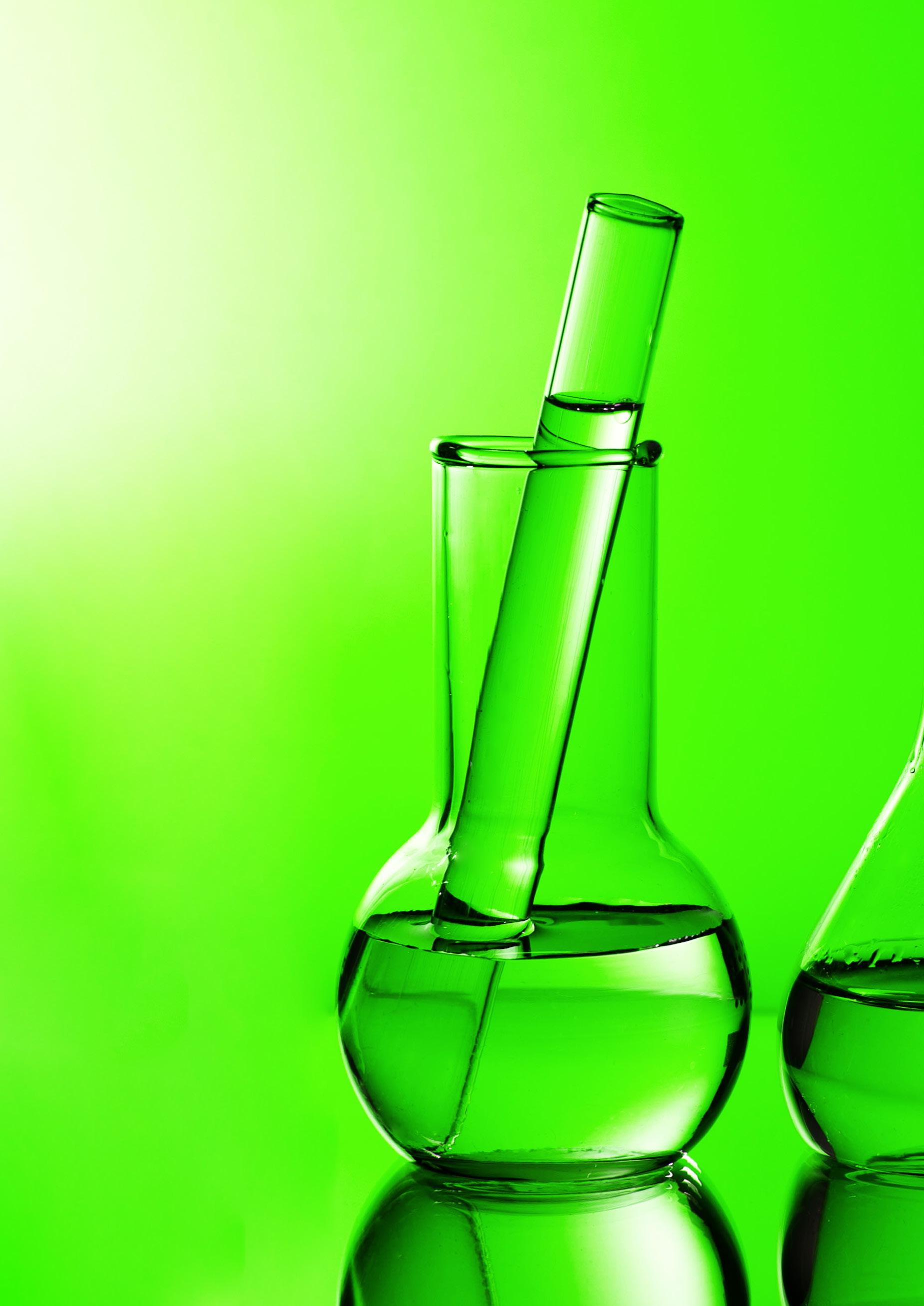
monash.edu/science/mgcst MASTER OF GREEN CHEMISTRY AND SUSTAINABLE TECHNOLOGIES
The future of industry is changing.
Advances in chemistry and engineering have shaped our world from pharmaceuticals, and food production, to the clothes we wear, the homes we live in, the cars we drive, our cosmetics, cleaning products, and so much more.

But it’s unsustainable.
Today’s new world demands a new approach –one that reduces or eliminates hazardous wastes from production processes.
That’s why Monash University is introducing the new Master of Green Chemistry and Sustainable Technologies – the first course of its kind in the Southern Hemisphere focusing on green and sustainable chemistry.
“Green chemistry is a paradigm shift. It is the ability not to just learn to effectively deal with and regulate the use of hazardous materials but to think outside the box and create products without using hazardous materials.”
Distinguished Professor John C Warner, Monash University School of Chemistry.
COURSE INTRODUCTION
The Master of Green Chemistry and Sustainable Technologies recognises the increasing demand for graduates with expertise in green chemistry to lead the transformation of chemical and other industries where the chemistry and chemical engineering play a crucial role, in delivering the products coming from those industries.

As a student in this program, you will have the opportunity to design and implement new products and processes that will highlight the role that chemistry has to play in addressing the UN Sustainable Development Goals.
The program will provide you with the principles of green technologies and a deep understanding of sustainability issues that will lead to the reduction or elimination of hazardous substances involved in the design, manufacture and application of chemical products. The course will also examine the environmental, economic and social benefits arising from the transformation of the chemical industries of the future.
2
DURATION
COURSE STRUCTURE
1 year
COURSE INTAKES
Semester 1
CAREER OUTCOMES
As a graduate of this course you will find many career opportunities open to you in a range of areas including:
• Process development and pharmaceutical companies
• Food, cosmetics and cleaning companies
• Agrochemical and polymer industries
• Manufacturing, environmental and sustainableservices or companies
• Private and public biotech companies
• CSIRO and chemical research institutes
• Government and consultancy
• Education.
The course is structured in four parts.
Each part is 24 points. All students complete
Parts A and C. Depending upon your prior qualifications, you may receive credit for specific units in all parts of the course for relevant qualifications at undergraduate or graduate levels, respectively.
Part A. Green Chemistry and Sustainable Technologies
In these studies, you will be introduced to key concepts in Green Chemistry and Sustainable Technologies including the design and thinking processes that lead to the production and management of future chemicals in a variety of industries. You will participate in a consultancy projects to gain an authentic perspective in the discipline.
Part B. Further Studies in Chemistry
These studies will develop the discipline knowledge and skills in Chemistry required to study Parts A and C.
Part C. Specialist studies in Green Chemistry and Sustainable Technologies
You will develop expertise through studio-lab studies in the design and chemical applications of Chemistry. These studies are complemented by a range of units selected to either deepen your knowledge of green chemistry, manage sustainability or engage with key concepts related to the environment.
Part D. Advanced practice in Green Chemistry and Sustainable Technologies
You will select a coursework pathway or thesis.
The coursework pathway option includes the opportunity to undertake an internship in industry or a desktop project; these options are studied alongside a choice of listed electives.
The second option is to undertake a 24 point research project requiring a thesis output. If you wish to use this Masters course as a pathway to a higher degree by research, you should consider taking this second option.
4 CAMPUS Clayton campus
(March), Semester 2 (July).
years full time (if you have bachelor degree with at least first year Chemistry subjects or equivalent) 1.5 years full time (if you have previously completed a major in Chemistry.)
full time (if you have previously completed a major in Chemistry and a significant research project in a related area.)
AT A GLANCE:
COURSE
YEAR 1 STUDY AREA SUBJECT
PART A Green Chemistry and Sustainable Technologies
Core component of the program
PART B Further Studies in Chemistry
For people with a limited chemistry background
24 credit points
• GCH5010 Green Chemistry Fundamental Principles (6)
• GCH5020 Business Model Design for Innovative and Sustainable Technologies (6)
• GCH5030 Green Chemistry Consultancy Project (12)
24 credit points
Students select four subjects from 2nd and 3rd level chemistry including:
• CHM2911 Inorganic and Organic Chemistry
• CHM2922 Spectroscopy and Analytical Chemistry
• CHM3972 Sustainable Chemistry
• CHM3911 Advanced Physical Chemistry
• CHM3922 Advanced Organic Chemistry
• CHM3941 Advanced Inorganic Chemistry
• CHM3952 Advanced Analytical Chemistry
• CHM3930 Medicinal Chemistry
• CHM3960 Environmental Chemistry
• CHM3180 Materials Chemistry
Students will receive course advice on the units they should take based on their academic background or work experience.
YEAR 2 STUDY AREA SUBJECT
PART C Specialist Studies in Green Chemistry and Sustainable Technologies
PART D
Advanced Practice in Green Chemistry and Sustainable Technologies
Core component of the program, but credit may be given for relevant research project
24 credit points
• GCH5110 Designing Safer Chemicals (6)
• GCH5120 Green Chemical Synthesis and Applications (6)
• Two subjects (12 points) from a range of Masters level options
24 credit points
Research pathway
Students undertake a 24-point scholarly research thesis over one or two semesters.
OR Coursework pathway
Students complete the GCH5930 Sustainability Internship (12)
OR the GCH5920 Sustainability Project (12)
Plus 12 points of electives from the Part C not previously completed.
Note – While a progression is implied in the course map below, only Part B needs to be undertaken in Year 1 for students needing more background in chemistry. It is preferable for Part A to be undertaken before Parts C and D, but not mandatory and flexibility is a feature to accommodate the student’s needs.
5MASTER OF GREEN CHEMISTRY AND SUSTAINABLE TECHNOLOGIES
MAP
Monash minimum: Level A, that is: IELTS (Academic):
ENGLISH LANGUAGE ENTRY REQUIREMENTS
overall (no band lower than 6.0); or Pearson Test of English (Academic): score of 58 overall with no band lower than 50; or TOEFL Internet-based test: score of 79 overall with minimum scores: Writing: 21, Listening: 12, Reading: 13 and Speaking: 18; or Equivalent approved English test.
WHO YOU’LL BE WORKING WITH:
• Professor Phil Andrews
• Dr Victoria Blair
• Professor Edward Buckingham
• Associate Professor Michael Grace
• Professor Tanja Junkers
• Dr Sara Kyne
• Professor Antonio Patti
• Professor Andrea Robinson
• Dr Alexandr Simonov
• Professor John Warner.
MINIMUM ENTRY REQUIREMENTS
ENTRY LEVEL 1:
96 points to complete –
Duration: 2 years full-time, 4 years part- time
An Australian bachelor degree (or equivalent) with at least first-year Chemistry Studies* and at least 60% (credit) average overall, or equivalent qualification and experience approved by the faculty leading the specialisation.
*knowledge of topics in Composition and Nomenclature of Matter; Physical, Chemical, Electrochemical Properties of Matter; Drivers of Molecular Interactions and Stability; Quantifying Chemical Reactions; Principles of Chemical Analysis.
ENTRY LEVEL 2:
72 points to complete –
Duration: 1.5 years full-time, 3 years part-time
An Australian bachelor degree (or equivalent) in a cognate discipline including Chemistry, Chemical Engineering, Biomedical Science, Materials Science, Biochemistry, or Biotechnology (with at least 12 points or equivalent of second level Chemistry) with at least 60% (credit) average, or equivalent qualification and experience approved by the faculty leading the specialisation.
ENTRY LEVEL 3:
48 points to complete –
Duration: 1 year full-time, 2 years part- time
An Australian bachelor honours degree (or equivalent) in the cognate discipline of Chemistry or Biochemistry with at least 60% (credit) average, or equivalent qualification and experience approved by the faculty leading the specialisation.
6
6.5

7MASTER OF GREEN CHEMISTRY AND SUSTAINABLE TECHNOLOGIES
FURTHER INFORMATION
MONASH UNIVERSITY monash.edu
FIND A COURSE monash.edu/study
INTERNATIONAL STUDENTS monash.edu/study/international
OFF-CAMPUS LEARNING monash.edu/study/international
MONASH ON YOUTUBE youtube.com/monashunivideo
FUTURE STUDENT ENQUIRIES
Australian citizens, permanent residents and New Zealand citizens monash.edu/study/contact
International students
T Australia freecall: 1800 MONASH (666 274)
T +61 3 9903 4788 (outside Australia) E study@monash.edu
Wechat: MonashUniAus Youku: Monash 蒙纳士大学

MONASH SCIENCE ONLINE
WEBSITE monash.edu/science
FACEBOOK MonashUniScience
INSTAGRAM monash_science
TWITTER @Monash_Science
YOUTUBE youtube.com/ScienceMonashUni
YOUR ESSENTIAL GUIDE TO MONASH SCIENCE
monash.edu/science/future-students/ your-essential-guide-domestic-students
The information in this brochure was correct at the time of publication (July 2022). Monash University reserves the right to alter this information should the need arise. You should always check with the relevant Faculty office when considering a course. CRICOS Provider: Monash University 00008C. Monash College 01857J. Produced by UMAC, Monash University. 22-AS036.





